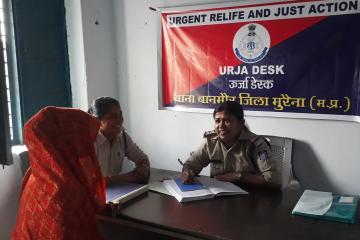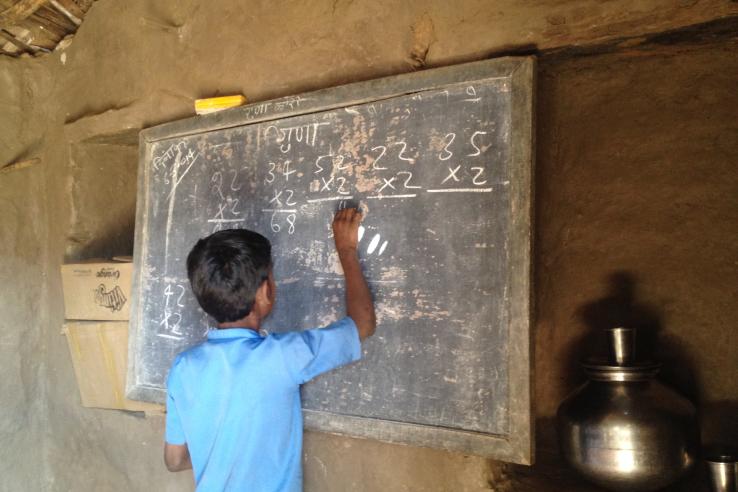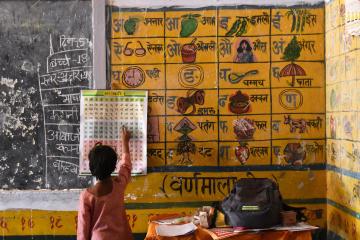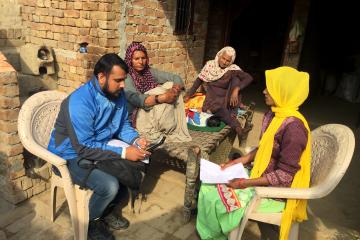
Researcher Spotlight: Harini Kannan on partnering with government to scale evidence-informed programs across India

This podcast and blog series brings together researchers reflecting on their experiences conducting impact evaluations in India. From working in diverse local contexts to engaging with government and civil society, each episode offers a window into the realities of producing policy-relevant evidence on the ground.
In this episode of the Researcher Spotlight Series, host Sambhav Choudhury speaks with Harini Kannan, research scientist at J-PAL South Asia. Harini shares her journey from being inspired by budget speeches as a child to pursuing a career in development economics. Drawing from her extensive experience collaborating with government partners across India, Harini offers valuable insights into building effective partnerships and scaling evidence-informed programs.
Want to learn more? Explore other podcast episodes in this series where we speak with Sandip Sukhtankar on his research in India, Shobhini Mukerji on her journey into development economics, Ariel Zucker on applying economic theory to real-world solutions, and Gautam Rao on co-producing evidence with policymakers.
Listen to our conversation
Sambhav: Hi everyone, welcome to an episode of J-PAL South Asia’s Researcher Spotlight conversation series. My name is Sambhav Choudhury, and I am a research associate at J-PAL South Asia.
Today, I'm in conversation with Harini Kannan. Harini is a research scientist at J-PAL South Asia. Her research interests are in the education and health sectors. Apart from leading projects at J-PAL, she works with the capacity-building team, providing advisory services for various partners such as USAID1, the Government of Haryana, the Government of Tamil Nadu, and Pratham.
On the weekends, you can find Harini baking or cooking. This year, she went all out and baked 24 cakes on Christmas for her friends!
Hi Harini, thanks for talking to us today.
Harini Kannan: Thank you, Sambhav. Thank you for having me.
Sambhav: We would love to begin by asking you—what got you interested in development economics and the experimental approach?
Harini Kannan: I think ever since I was a really young child, I was very interested in what happened around me. I was very interested in politics. At some point, I remember watching the budget speech with my grandfather, and it felt so powerful. I think it was Manmohan Singh who was delivering it. He was basically telling everyone how the money would be spent—so much on education, so much on this program or that program.
I still remember that when I was in maybe 9th or 10th grade, I decided that I wanted to be the Finance Minister of India because the budget speech just inspired me. That influenced my decision to study economics, which wasn’t something many people in Chennai pursued in the late 90s. It was a bit of a battle to convince my teachers that economics was something I wanted to do and why. But once I got into it, there was nothing that could pull me away from it—it was just so wonderful.
It gave me a way to look at the world, and my interest in public policy continued. I eventually did a PhD in public finance and policy. But I always knew that I didn’t want to work in academia. I wanted to work at the intersection of government, fieldwork, and research.
After my PhD, I struggled to identify where I could work because these kinds of opportunities didn’t quite exist in India in 2010. Then someone told me about J-PAL. Of course, I knew about Abhijit Banerjee and Esther Duflo, but I wasn’t aware of J-PAL itself.
It was a fateful meeting with Shrinivas, and I got into this work. It turned out to be the perfect fit for me because I get to do a lot of different things, and my portfolio keeps changing in ways that I both appreciate and enjoy.
Sambhav: That is quite inspiring!
The next question we have is about your paper Informal Math Games to Improve Children's Readiness for Learning School Mathematics in India. Can you briefly tell us how it was working on this project and some of the challenges of running an education intervention with children?
Harini Kannan: I think the best part of this project was working with Elizabeth Spelke, the cognitive psychologist at Harvard. She opened my eyes to a completely different set of literature—something I may not have been exposed to otherwise.
This project was all about how children learn mathematics, how innate skills exist among most humans (and even some primates), and how these skills can be leveraged to learn formal mathematics. Every conversation with Liz feels like a graduate class in cognitive science, and it has been absolutely wonderful.
What made this project unique was that we weren’t just evaluators—we were also implementers. And not just overseeing implementation, but actually designing the program ourselves.
I remember looking at these games developed at Harvard and thinking, This seems difficult. These games were originally designed for lab studies, where children played them for half an hour before an assessment. Our challenge was to turn them into a three- or four-month curriculum—something systematic, with scaffolding and increasing difficulty, while also keeping children engaged.
Piloting this was one of the most interesting experiences of my life. On the first day, I thought it was never going to work. My research assistant and I struggled because we didn’t know how to make four- and five-year-olds sit down. One child climbed onto my lap, another was pulling my RA’s dupatta—we were just completely overwhelmed.
From that chaotic moment in 2013 to now in 2023, where we are scaling up these programs across five different states, it has been a fantastic journey.
Sambhav: That’s amazing! In your experience, what key factors or strategies have proven effective in forming partnerships with governments or other stakeholders for your projects?
Harini Kannan: I think the most important thing is to listen to them. Sometimes, we may have a tendency to tell them, This is your problem, and this is how you should solve it. But what works best is letting them speak and then guiding the conversation toward solutions.
Building personal relationships is crucial. In many of my projects—especially those in Haryana—I’ve had endless cups of sugary, milky chai while sitting with government officials. I realized that these informal conversations help you understand the undercurrents and nuances of a department.
If your goal is to get approval for a project, of course, you engage with top-level officials. But it’s just as important to engage with people down the chain. Your IAS officers will move on, but your state civil service officials will stay for years. Getting them excited about the project and respecting their perspectives is key.
Many government officials may not have read Esther Duflo’s book or fully understand RCTs, but they are equal stakeholders in the process. Working across all levels of government hierarchy is extremely important.
Sambhav: That’s really great advice. Now, looking at the bigger picture—how do you see your work affecting policy decisions and improving people’s lives?
Harini Kannan: We all hope that our research projects will be so impactful that they get scaled up. I’ve been fortunate to be part of three different studies that are currently in different stages of scale-up.
I’ve seen the full cycle—starting with an idea, running an evaluation, piloting an intervention, and then scaling it up. What fascinates me is how challenges evolve across these stages.
Over the past few years, I’ve worked more on scale-ups, and I’ve realized that running RCTs is much easier than scaling up interventions!
Sambhav: That’s a great insight. As a final question—what research projects are you excited about in the near future?
Harini Kannan: One project I’m really excited about is reading games—companion games to our existing math games. We just started piloting them in Delhi. If the pilot goes well, we plan to turn this into an RCT.
Another exciting project is linking datasets from different government departments to track long-term outcomes. We’re still in early stages, but I’m looking forward to seeing where it goes.
Sambhav: That sounds fascinating! Thank you, Harini—this was an inspiring conversation. Best of luck with your upcoming projects!
Harini Kannan: Thank you, Sambhav! Hope to see you at J-PAL soon.
[1] This conversation was recorded in late 2023, prior to the closure of USAID.


